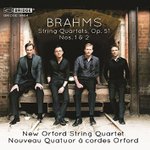|
Back
02/23/2016
Johannes Brahms: String Quartets, opus 51, N° 1 and N° 2
New Orford String Quartet: Jonathan Crow, Andrew Wan (violin), Eric Nowlin (viola), Brian Manker (cello)
Recording: Multi-Media Room, Schulich School of Music, McGill University, Montreal, Canada (May 2013) – 69’39
Bridge # 9464

   
The New Orford String Quartet (established in 2009) gets its name from two sources. The first is the Orford Art Centre in the province of Quebec, site of a summer music festival. The “New” part is to differentiate itself from the first Orford String Quartet, which flourished from 1965 to 1991 as Canada’s ranking string quartet.
It is not a full-time quartet, as its members have major orchestral careers: Jonathan Crow is the concertmaster of the Toronto Symphony Orchestra, and Andrew Wan has the same position with the Montreal Symphony Orchestra. (The two violinists switch the first and second parts in the two works on this recording.)
Eric Nowlan is associate principal violist with the Toronto Symphony Orchestra and is soon to be principal violist with the Detroit Philharmonic. Cellist Brian Manker is the principal cellist with the Montreal Symphony Orchestra.
I find that chamber music benefits more than any other from being experienced live. The interrelationships between the players are an essential part of the drama as one follows the “pathway” of a piece from player to player. Listening to a recording is a different experience. Especially with this super-pristine recording (the Schulich School is gaining renown in many fields), I found myself captured by the sheer aural beauty. The subtle changes of harmony and pacing seem to melt out of the sir. The recording brings forth the warmth and sensuousness of the romantic side of Brahms as opposed to the rather daunting symbol of 19th century monumentalism.
As with so many of Brahms’ major works, these two quartets were the product of years of trial and error (as he saw it), much like the great Symphony N° 1, presented three years later. While he is noted for his chamber works, he only wrote three string quartets (these were the first two.) The results here are subtle and intimate rather than bold.
These quartets are part of the essential core repertory of any quartet and as a result, there are many fine recordings. The New Orford Quartet does not perform often and when they do the pieces are freshly (and thoroughly) prepared. I eagerly await more recordings from them.
Michael Johnson
|